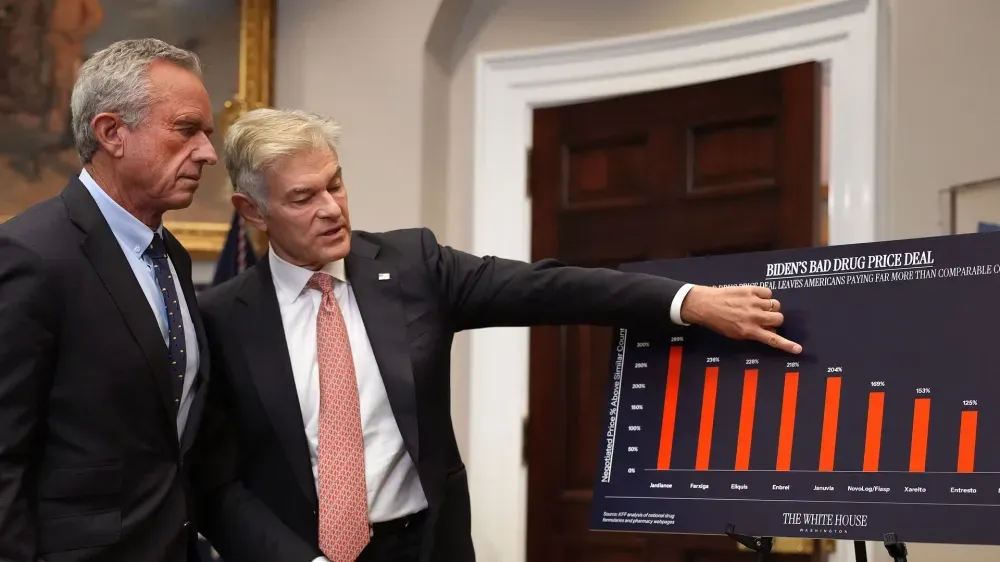Insurers Say They’ll Cut the Red Tape — But Will They Actually?

Executive Summary
On June 23, 2025, Health and Human Services Secretary Robert F. Kennedy Jr. and CMS Administrator Dr. Mehmet Oz announced a new, industry-wide pledge from more than 30 major health insurers aimed at fixing one of the most frustrating choke points in U.S. healthcare: prior authorization.
Collectively covering 75–85% of insured Americans, insurers like UnitedHealthcare, Aetna, Cigna, Humana, Blue Cross Blue Shield, and Kaiser Permanente agreed to implement six key reforms to reduce delays, automate approvals, and improve transparency for patients and providers alike.
The Six Commitments:
- Reduce the volume of prior auth requirements
- Standardize and automate the process with electronic workflows
- Expand real-time decisions for common services
- Simplify documentation for providers
- Honor authorizations for 90+ days during plan switches
- Improve transparency around decisions and appeals
📅 Reform milestones:Reduce usage by January 1, 2026Implement full electronic prior auth by January 1, 2027
This is a voluntary pledge, not a federal mandate. But Oz and RFK Jr. made it clear: if insurers don’t follow through, regulation is coming.
Meanwhile, Oz also challenged pharmacy benefit managers (PBMs) to eliminate rebates that obscure pricing and inflate employer costs — but PBMs aren’t yet included in the formal pledge.
Sources:
5 Takeaways – KFF Health News
Western Journal Summary
Bloomberg on PBM Rebates
Will Your Benefits Team Actually Feel This?
If the carriers follow through—and that’s a big if—this could make a real difference in how employees experience your health plan, and how your HR team manages it.
Here’s what could improve:
- Faster access to care
No more waiting 7–10 business days just to get a green light for a basic MRI. Common procedures and medications could move into real-time approvals, which means less time out of work and less stress on families. - Fewer denials and appeal escalations
With clearer standards and less red tape, your team isn’t stuck navigating multi-step appeals—or explaining why a therapy visit was denied even though it was previously approved. - Smoother plan transitions
When employees switch carriers (or jobs), prior auths will now be honored for 90 days. That’s a big deal for employees managing chronic conditions who can’t afford gaps in care. - Less doctor burnout = better provider networks
The average physician spends 12+ hours a week on prior auth tasks. Reducing that load improves morale and retention—especially in overburdened specialties. That benefits your network access. - Plan reputation improves
Fewer frustrations, fewer horror stories, and fewer “this plan sucks” Slack messages. Which means higher perceived value, and better open enrollment vibes.
And for self-funded employers—this is a rare chance to put pressure on your TPA. You don’t have to wait until 2026. Ask for a roadmap now.
This isn't magic. It’s operations.
And if it’s not showing up in your plan performance by Q1 next year… it’s fair to ask why not.
Why This Might Actually Stick
We’ve seen big talk before. But this time? There are a few reasons to believe the follow-through could be real:
The big guns are signed on.
This isn’t a niche carrier pilot. United, Aetna, Cigna, BCBS, Humana, Kaiser—they’re all in. That’s 75–85% of the market. If they move, the rest follow or get left behind.
There are actual deadlines.
Jan 1, 2026: less prior auth overall.
Jan 1, 2027: fully electronic, standardized workflows.
That’s more structure than most pledges get—and it gives employers a clear timeline to track.
The pressure is external, not just internal.
RFK Jr. and Dr. Oz aren’t asking nicely. The message is: “Clean this up or we’ll regulate it for you.” That gets attention in boardrooms.
Public sentiment is brutal.
Prior auth delays are the villain of the healthcare story—whether you’re a patient, provider, or policy nerd. This has real PR downside if it doesn’t improve.
Health systems are already wired for this.
Many providers already have the tech to handle real-time approvals—if insurers flip the switch. It’s not about new tools. It’s about new behavior.
It’s bipartisan... weirdly.
A Kennedy. A TV doctor. A Trump cabinet.
No matter how you vote, this is getting attention. And that makes it harder for carriers to quietly walk it back.
Bottom line: the stars are aligned.
Now it’s on employers—and watchdogs—to keep the pressure on.
Why This Might Be All Hat, No Cattle
We’ve seen this movie before. Cue the press release, queue the LinkedIn claps, and then… nothing changes. Here’s where this could go sideways—fast:
It’s all vibes, no law.
This is a handshake deal, not a binding contract. If carriers decide to ghost the pledge in 6 months? Nobody’s sending the cops.
“Real-time” means whatever they want it to.
One carrier’s “instant approval” is another’s “we’ll get back to you next Thursday.” Until these terms are standardized, it’s marketing copy—not operations.
TPAs are playing hide-and-seek.
Self-funded employers: if your TPA wasn’t in the room, don’t assume these upgrades are coming to your plan. Spoiler: they’re probably not—unless you demand it.
PBMs still dodging daylight.
Dr. Oz talked tough on rebate reform, but pharmacy benefit managers are still the Wizard of Oz behind the curtain. No changes here (yet), just more smoke.
Execution risk = the silent killer.
We’ve all been there. A solid policy turns into a Kafkaesque nightmare once it hits the carrier’s call center or their AI claims assistant that still thinks it’s 2021.
Let’s not forget: insurers made a similar pledge in 2018.
They said the right things. Then they shrugged, went quiet, and kept the fax machines humming.
Then vs. Now: Prior Auth Promises on Repeat
| 2018 Pledge | 2025 Pledge |
|---|---|
| ✔ Voluntary effort led by AHIP and major provider groups | ✔ Voluntary pledge led by HHS (RFK Jr.) + CMS (Dr. Oz) |
| 🚫 No deadlines or enforcement | ✅ Hard deadlines: Jan 2026 + Jan 2027 |
| 🌀 Focused mostly on streamlining for providers | 🎯 Broader: includes real-time approvals, electronic automation, member experience |
| 🙈 Limited public accountability | 📣 National press conference + public commitments |
| 📉 Result: Mixed adoption, little measurable change | 🔍 TBD — but regulators are signaling enforcement if things stall |
Bottom Line: The 2025 pledge sounds bolder, but we've heard this song before. The difference this time? Employers like you are watching—and asking better questions.
Our Take (and What to Do About It)
Let’s be honest: the pledge sounds great on paper. Big insurers promising to make care faster, simpler, and less painful? Love it.
But here’s the problem:
There’s no way to verify it. No enforcement. No transparency. Just trust.
If you’re fully insured, how will you know if your plan is actually honoring these changes?
If you’re self-funded, is your TPA even participating?
If you’re neither, are you just hoping your employees get lucky?
We’ve seen this movie before—2018, anyone? Big press, no follow-through.
So while we’d love to believe that bureaucracy is getting benched… we’re going to wait for proof.
In the meantime:
👉 If you’re fully insured — ask your carrier rep how they’re aligning with the six-point pledge. And ask how you’ll know it’s real.
👉 If you’re self-funded — press your TPA now. Don’t wait until 2027 to find out they weren’t planning to change a thing.
👉 If getting a referral feels like watching the Bears try to run a two-minute drill — yeah, it’s time for a new game plan.
We can help. No prior authorization required. Click to Contact Us



